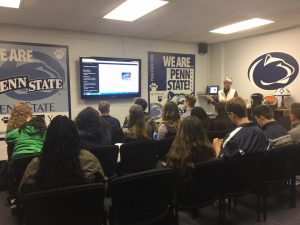A tremendous thanks goes out to Kristy Hove for coordinating the Lehigh Valley participation and to the 200+ faculty and students in the HDFS first-year experience courses at LV who participated in the project!!! Two sessions were offered on Friday November 10th – one on the value of group and informal student-to-student support and the other open session for the campus with a general overview of resilience and strategies to help students build up inner resources and navigate challenges.
Power of Student-Student Support
For the group support session, I focused on activities to set a peaceful environment and build awareness and connection between students in the class as follows: Awareness Meter *, Fast Friends *, Inclusion of Other in Self Scale*, Friendly Wishes for Each Other *, Anchor Breathing, Fortune Teller *, and Taking in the Good*
We used as a guiding principle the research by Dr. Barbara Fredrickson and researchers in her PEP lab at UNC Chapel Hill on positivity resonance, a very powerful approach to making connections. According to her research, if we share positive emotions with another which generate feelings of mutual care, we can derive a plethora of benefits including better mental and physical health and resilience, among others.
We ended the session with a series of reflective exercises: QICS (Question, Insight, Connection, Surprise), Setting an Intention (As a result of the session, I would like to continue to do…), Generating Mutual Care (answer 2 questions – In order to support your classmates, what would you be willing to do… In order to feel supported, you’d like your classmates to do… for you), and finally, students filled out a card with a friendly and encouraging wish for themselves. They placed it in a sealed, self-addressed envelope which I’ll mail to them by finals week.
Building Inner Resources and Strategies to Build Resilience
In the large open session for the campus, I started with a general overview of resilience and the important fact that our levels of resilience can change. With the proper support and good strategies that help us grow stronger internally and deal effectively with issues as they arise, we can become more resilient as we work through our daily challenges. Students received the strategies bag and we alternated between information on building resilience and practicing strategies.
It was a great day, and I’m grateful to Kristy Hove and the HDFS FYS faculty and students for making it such a wonderful experience!
Handouts and the presentations are available at this link.
Resources
Awareness Meter, Friendly Wishes (Mindful Games; 2016, Greenland, S.)
Fast Friends (https://rascl.berkeley.edu/uploads/page-gould_2008_journal_of_personality_and_social_psychology.pdf)
Fortune Teller – Hope Labs – https://www.slideshare.net/hopelab/wizbiz-fortune-teller-how-to-13153534
Fredrickson, B.L., (2013), Love 2.0. Plume, New York, NY.
Inclusion of Other in Self Scale (http://ww3.haverford.edu/psychology/ble/continuous_ios/originalios.html)
Taking in the Good – Rick Hanson – http://www.rickhanson.net/take-in-the-good/


